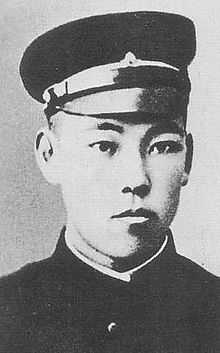Misao Fujimura


Misao Fujimura (藤村 操 Fujimura Misao, July 1886 – May 22, 1903) was a Japanese philosophy student and poet, largely remembered due to his farewell poem.
Biography
Fujimura was born in Hokkaidō. His grandfather was a former samurai of the Morioka Domain, and his father relocated to Hokkaidō after the Meiji Restoration as a director of the forerunner of Hokkaido Bank. Fujimura graduated from middle school in Sapporo, and then relocated to Tokyo where he attended a preparatory school for entry into Tokyo Imperial University.
Fujimura became distraught when rejected by Tamiko, the eldest daughter of Kikuchi Dairoku, in favor of Tatsukichi Minobe, whom she later married. He traveled to Kegon Falls in Nikko, a famed scenic area, and wrote his farewell poem directly on the trunk of a tree before committing suicide.[1] His grave is at Aoyama Cemetery in Tokyo.
The story was soon sensationalized in contemporary newspapers, and was commented upon by the famed writer Natsume Sōseki, an English teacher at Fujimura's high school. Later Sōseki wrote on his death in Kusamakura.
Poem
The poem he wrote before his suicide read:
Delicate line between heaven and earth…
The calm of the ages,
all the world’s worth.
Such minuscule measure,
while we think it so grand…
Just five specks of smallness,
This soft quiet land.
So frail and so fleeting,
in the end you will see
Simple dreams were Horatio’s philosophy.
For all the truth,
all creation,
all secrets of yore
Can be told in an instant,
by then they’re no more.
Ah, The Unexplainable
All worries unsettled,
heartache unresolved…
All questions unanswered,
with death, shall be solved.
We already teeter,
this sheer cliff so high.
When we fall to corruption,
insecurities die.
To end is to start;
to surrender is to know.
Despair and depression,
together they grow.
Hope shall meet hopeless
when there’s nowhere to go.
References
|